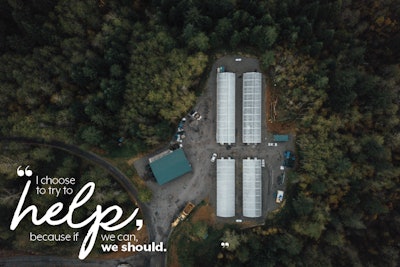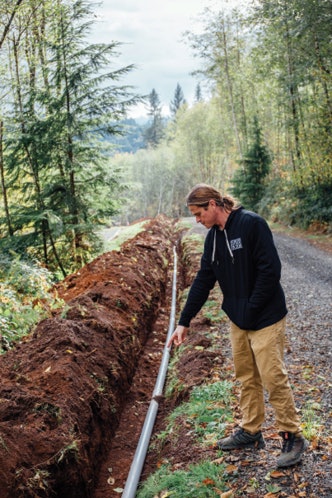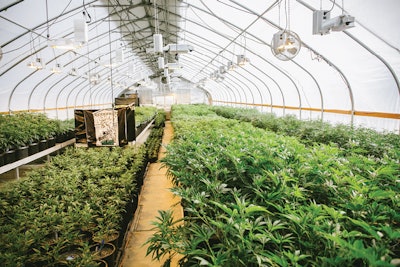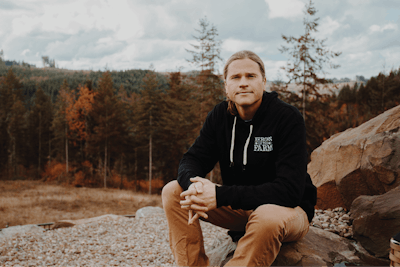
Patrick Pooler knows that an individual’s success is built with the help of a supportive community. Without his mother’s support, Pooler never would have made it to Oregon to attend Windells Snowboard camp in 2004. Without attending Windells, Pooler never would have made long-lasting friends who introduced him to the West Coast cannabis culture. And without those friends, Pooler never would have become the owner of Sandy, Ore.-based Heroes of the Farm.
Community is a big part of Pooler’s personal and business ethos: He would rather lose a sale than a friend. “My company was originally built on those friendships, because before this was an industry, this was a community,” he says.
And since industry friends helped him launch this company, Pooler now is doing his best to pay it forward.

‘Heroes’ Origins
Pooler’s cannabis story begins where many others do: at a hydroponics store, where talking about marijuana could promptly get you thrown out the door.
Talking about tomatoes, the vendor sold him a 1,000-watt HPS light for 10 freshly sprouted cannabis plants in a 4-foot by 6-foot cubbyhole inside a closet with no ventilation. Pooler remembers returning “a couple hours later,” he says, “and it was like 140 degrees in my closet, and those plants were definitely dead.”
With a valuable lesson learned, Pooler had more success on subsequent attempts, in part by moving to a different location. He also changed hydroponics stores to Northern Lights and Garden, whose owner, Trace Myers, spoke to Pooler about cannabis, not tomatoes. Pooler’s thirst for more cannabis knowledge kept him coming back to Myers’ store, to the point where he would volunteer labor just to be around the place.
“I ended up one day coming in there, and an 18-wheeler of Fox Farm Soil pulled up, and they literally had like a 36-inch [wide] ... door, and they had, I think, 13 or 16 pallets of soil that they had to pull every bag off—it was pouring down rain—and bring [them] inside, [and] stack [them] up to the ceiling. So I offered to help.”
Eventually, he was offered a job at minimum wage, which he gladly took: The employee discount and the access to vendors were the perks in which he was interested, especially since he moved to a new house in southwest Portland and was growing in Oregon’s medical cannabis caregiver program. That vendor access, Pooler says, “gave me a huge advantage in price, and it gave me a huge advantage in my education, and it also gave me a huge advantage in always being current and upfront with the future technology that’s coming into play before it’s dropping.”
In the new house, dubbed “8541,” Pooler’s operation expanded at the same rate as his roommates left. Starting with a single-light setup, Pooler slowly added 15 more. His employee discount allowed him to experiment with different systems, and often he went through only a couple of crop cycles before switching something.
After his time at the hydro store, Pooler moved on to a sales position with Advanced Nutrients just as the company was starting to ramp up its cannabis marketing campaign. He learned a lot from his time there, he says, especially about how to properly treat employees from then-CEO Robert Higgins (who now heads up the nutrient company Emerald Harvest).
“If your people feel like they’re replaceable ... in a company, that’s definitely not the best way to go about things,” Pooler says, so he goes out of his way to ensure every employee feels supported.
Working for the nutrient company also allowed Pooler to boost his network. Growers who heard he worked for a nutrients company would invite him to visit their cultivation operations. Before he knew it, he had visited everything from basements and garages to large greenhouses and outdoor operations.
“Anytime I feel like I go to someone’s grow, big or small, you [may] find … the one thing that they’re doing that you can learn from and then you can go implement.” Some of his biggest lessons came from the Canadian agriculture industry. In the early 2000s, U.S. growers were focused on air-cooled hoods and traditional style gardens, whereas Canadians he worked with “were running sealed rooms with open reflectors, large A/C units, and injecting rooms with CO2,” he says. “The benefits to this style [were] massive, and [this] was a better overall approach to cultivation.”
‘Heroes’ Rises

When Pooler was approached by a friend who knew someone looking to partner with a grower on their 107-acre property in the shadow of Mount Hood, he realized an opportunity for himself to grow commercially, and at a large scale.
The property was overrun with trash, and six acres of the lot had been converted to a makeshift paintball course. The course spilled over to a neighboring property belonging to a lumber company, and Pooler had to remove plywood boards nailed to trees prior to the lumber company’s harvest. On the actual property, 11 cars needed to be removed, along with more than 500 tires, dozens of rims and 55-gallon drums, Pooler estimates. “Every time you turned around, there was more trash.”
Pooler began working on the property in 2010, and spent the next four years removing all the plywood, cars, tires, rims and drums from the property while still operating within Oregon’s medical program. Seeing all the work he had put into the property even before it was his, the original property owner’s wife dubbed Pooler and his crew “heroes of this farm,” and a brand was born.
In 2012, he bought 42 acres of the farm and paid off that purchase in 2014 when he sold his dream home in Sandy and moved to the property. In 2015, he bought the remaining two parcels of the 107-acre farm.
Pooler has been excavating the property for the past three years, moving mountains to level the ground, put up half a mile of rock walls, thousands of yards of gravel and a three-quarter-mile-long road, among other work. Pooler also oversaw the installation of 9,000 amps of power—three, 3,000-amp services, which are necessary to accommodate what Oregon classifies as three Tier 2 indoor recreational grows. This translates into 10,000 square feet of flowering canopy space per license, plus the additional vegetative space that the state allows. The farm currently has about 30,000 square feet in operation, but will ultimately be home to around 50,000 square feet when all three licenses are awarded.
Pooler believes owning the property and having the freedom to do things his way is more than worth the time and effort. “I no longer [have] restrictions on what I [can] do, because I [don’t] have to ask someone,” he says. “There [are] no corners we [have] to cut, there [is] no money trying to be saved. … Now we can build the dream.”

‘Heroes’ Builds
From his earliest days experimenting with cultivation, Pooler always favored quality over quantity. To achieve his desired results on such a large scale, Pooler reinforces the importance of not cutting corners. Growing “forced me, a young man, [to learn] patience, because you can’t rush plants.”
Not all of Pooler’s lessons translated to a larger scale. As much as he would like to inspect every plant manually, these inspections are time-consuming tasks that can be limited by tightly controlling the grow environment. To do this, Pooler has turned to a Variable Refrigerant Volume (VRV) system and a company called Unity Energy Solutions.
“They’re 50- to 70-percent more upfront in terms of cost, but you save 40 percent on your energy,” Pooler says of the VRV system. “Unity Grow Controls [is] basically an interface and program. Just imagine a giant iPad with all the information dialed in on your grow, and it can literally show your energy usage, outputs, set schedules for strains—the list goes on and on. But in the end it’s about energy savings and efficiencies.”
In addition to attention to detail, Pooler highlights his preferred nutrient line, a fertilizer called Herculean Harvest from Oregon’s Only Nectar for the Gods, as a big part of the company’s high-standard of quality over the years. But more than the nutrient line itself, Pooler says “it’s the full understanding of how to use the fertilizer line and implement it.”
To that end, Pooler is turning to friends from previous careers to customize different cultivation components. For example, the company’s current nutrient is too thick to be injected into a fertigation line, so Pooler is working with his friend, Oregon’s Only owner Scott Ostrander, on a thinner formula. In exchange for the work Oregon’s Only is doing, Pooler will do all the product testing and will provide data and feedback. The duo also is developing a Heroes of the Farm soil line, which Pooler plans on testing throughout the winter. He says the product he’s looking to create “has a little bit more nutrients upfront to provide some fertilizer for the early starts of everything, but something that still has good drainage and will leave us in control throughout the crop.”
On top of the power, lighting and irrigation systems upgrades being done on the nine greenhouses this winter, Pooler will introduce a water-reclamation system so the company can be more efficient with its water use, among other resources. “We’re a young company [run] by young people,” Pooler says, “so we’re constantly trying to become more efficient and more organized, and streamline systems.”

‘Heroes’ Serves
Along with growing high-quality cannabis, Pooler focuses on making sure he is making the world around him a better place. He credits his humble upbringing and his family, especially his grandfather and his mom, for those values.
Growing up, “I was a different kind of wealthy,” Pooler says. “I was rich with family and friends. Having this type of community and family is what has been instilled in my life.”
Being active in the community grants Pooler and Heroes of the Farm some goodwill. By giving back and being a positive influence in the city of Sandy, Pooler says, residents can look at the brand and say, “They’re doing things by the book, and they’re trying to help us. So these people are not our enemies, these people are not drug dealers; these people are hardworking members of the community, striving to make it a better place.”
So far, Heroes of the Farm has supported the Bradley Angle foundation, a battered women’s shelter in Portland (a matter close to Pooler’s heart), and a community garden operated by at-risk children in Sandy and through an outreach program called the AntFarm.
This year, Heroes of the Farm donated all the soil used in the community garden, as well as fertilizer and organic amendments. Pooler does not foresee ending that partnership anytime soon: Being able to physically see the impact he’s making is meaningful to him.
And while breaking down stigmas and promoting his business are nice benefits to Pooler’s philanthropy, the motivation is much simpler.
“I choose to try to help, because if we can, we should.”














